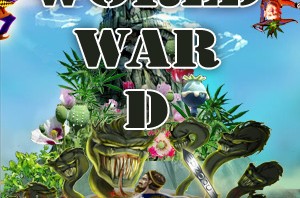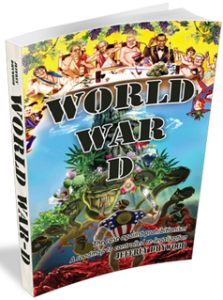Once in a long while comes a book that changes the way we look at a particular issue.
“World War-D” aspires to be such a book; it changes the way we think about the war on drugs, pulling it out of the ideological and moralist morass where it has been enmeshed from the onset, turning things on their heads – or I should say, back on their feet.
“World War-D” re-centers and refocuses the issue around a simple but fundamental question: “Can organized societies do a better job than organized crime at managing and controlling psychoactive substances?” I obviously think they can, and I explain why and how.
“World War-D” is the first book to bring one of the most contentious issues of our time to the mainstream in a comprehensive but accessible way, without being simplistic. It examines all the facets of the issue from a global perspective, repositioning it into the wider and more relevant context of psychoactive substances.
“Word War-D” offers a reasoned critic of the prohibitionist model and its underlying ideology with its historical and cultural background. It clearly demonstrates that prohibition is the worst possible form of control, as the so-called “controlled substances” are effectively out of control; or rather, they are controlled by the underworld, at a staggering and ever-growing human, social, economic and geopolitical cost to the world.
“Word War-D” is the first book to tackle the issue of legalization head-front, offering a pragmatic, practical, and realistic roadmap to global controlled re-legalization of production, distribution and use of psychoactive substances under a multi-tiers “legalize, tax, control, prevent, treat and educate” regime with practical and efficient mechanisms to manage and minimize societal costs. Far from giving up, and far from an endorsement, controlled legalization would be finally growing up; being realistic instead of being in denial; being in control instead of leaving control to the underworld. It would abolish the current regime of socialization of costs and privatization of profits to criminal enterprises, depriving them of their main source of income and making our world a safer place.
102 years after the launch of global drug prohibition, 40 years after the official declaration of the war on drugs, one year before the Mexican and US presidential elections where the legalization debate will be one of the major issues, “World War D” is timely and long overdue, as its topic is rapidly moving from fringe lunacy to the mainstream. A growing wave of support for drug policy reform is rising throughout the world; the war on drugs failure is being denounced across the board, from church groups to retired law enforcement, to the NAACP, to Kofi Annan, George Shultz, Paul Volcker and a string of former Latin American and European heads of state.
The book is intended for an international audience and aims to be a major contribution to the war on drugs debate.
Product Details
- 448 pages – format: 6×9
- Publisher: Columbia Communications Inc; First edition (October 24, 2011)
- Language: English
- ISBN:
- Paperback: 978-0984690404
- Kindle edition: 978-0-9846904-1-1 – ASIN: B005XH20CQ (Amazon)
- Epub/Nook edition: 978-0-9846904-2-8
- PDF edition: 978-0-9846904-3-5
Reviews and comments on “World War-D”
Gustavo de Grieff – was Attorney General of Colombia and oversaw the capture of Pablo Escobar and the surrender of the Cali Cartel; Gustavo de Grieff is one of the very few high level officials who called for legalization while he was in office:
I find that you have written one of the best books on the drug problem that I have read (and I have read more than thirty books on that subject). For example, your history of prohibition in part 1 is without any doubt the best I have ever read.”“your chapters on possible legalization and regulation and on your counter arguments against it are excellent and I subscribe to them entirely.
LEAP founder and Chairman, Jack Cole:
It is a very good read and already I can say a very important work. You did a fantastic job. It is up there with the very best drug policy books.
Arthur Torsone, author of “Herb Trader”:
I believe your book will be extremely helpful to those who have the power to reverse the existing draconian drug laws. Hopefully your book will be a road map to a sane conclusion.
When the rulers of our land eventuality exchange prisons for medical clinics the bible hand book that will be used to EDUCATE the citizen in need of help should be your book. It shows how and why we humans react as we do to outside substances.
I’m still blown away by the incredible amount of detailed information you have, what an extraordinary work of literature you have here, congratulations.
Santiago Roel, Crime Prevention consultant pioneering government reform in Mexico since 1991. Author, lecturer – www.prominix.com:
It is a thorough and well-documented compilation, a global overview of all the issues revolving around the war on drugs, prohibitionism and psychoactive substances. It offers a methodical, well-argued and compelling case against prohibitionism and a realistic and pragmatic roadmap to global legalization. Anyone genuinely interested in understanding this failed war and its negative impact on the World should begin by reading this book.
John P., typesetter, while working on book layout:
“I am fairly amazed by the content, as I read pieces; this is impressive. There is nothing out there like that.”
While working on my project back in November 2010, I established contact with former UNODC chief Antonio Maria Costa. Underneath are some of Mr Costa’s replies to my correspondence:
I just do not get all this insistence on “war on drugs”. I never used this term. The United Nations never used this term. I fear it is being used to mask other objectives. Drugs were banned by member states because they are dangerous, they are not dangerous because they are banned.
If you believe that some sort of (whatever form of) legalization of drugs would be the correct answer – well, I am afraid this would be dangerously naive. In other words, if this is the answer you would like to receive, I must conclude that the set of issues you raised are a bit more complicated than you seem to realize.
When I asked him for his reaction to the Global Drug Policy Commission, counting among its members Kofi Annan, who was UN Secretary General while Mr Costa was UNODC Director:
The only common denominator among them is “former”. What is wrong with people who, when in office say one thing, when out of office say its opposite?
I try in “World War-D” to understand where such attitudes come from, how we got where we are, how we are still there after so many years of hopeless failure, how we can accelerate the move beyond such attitudes.


